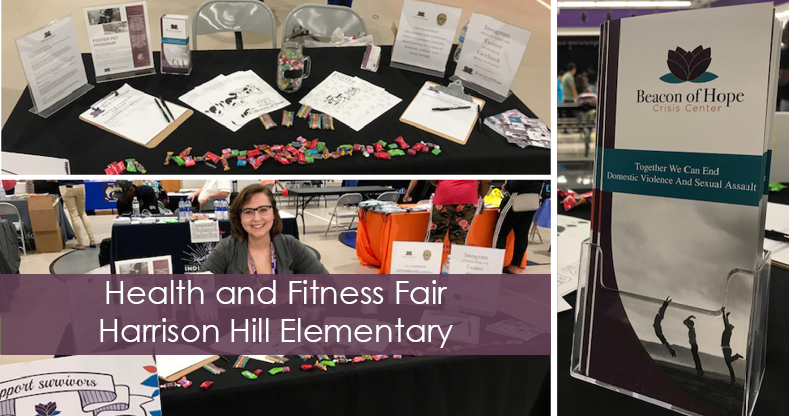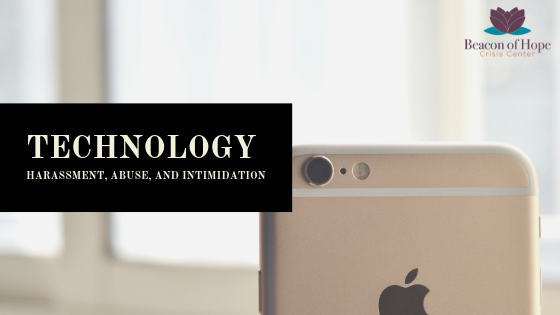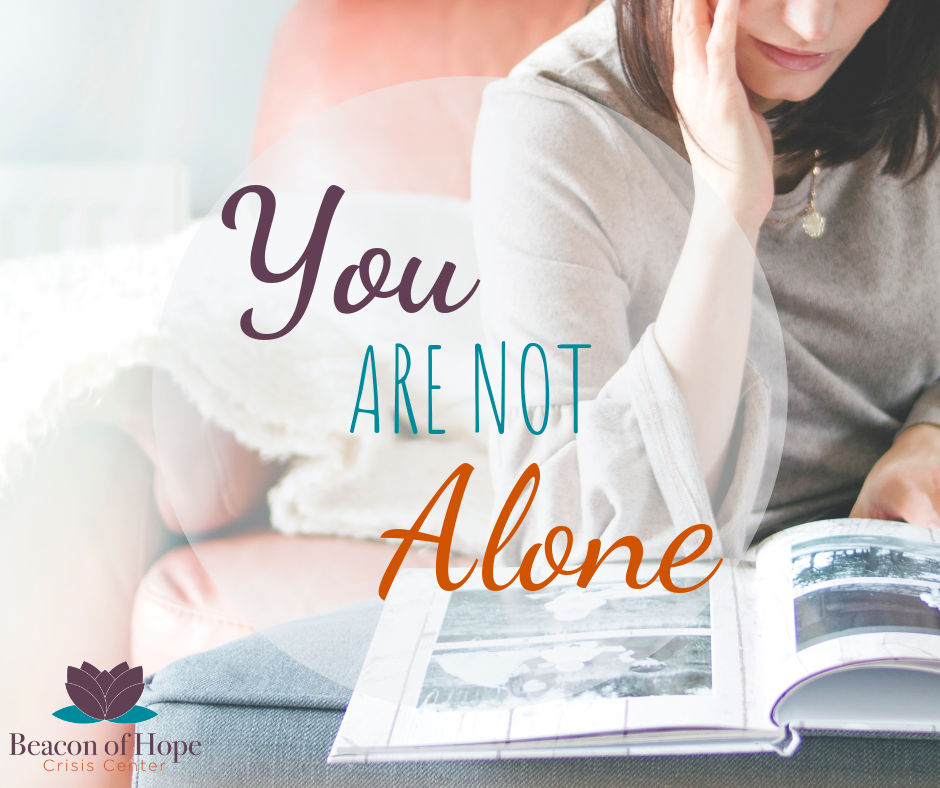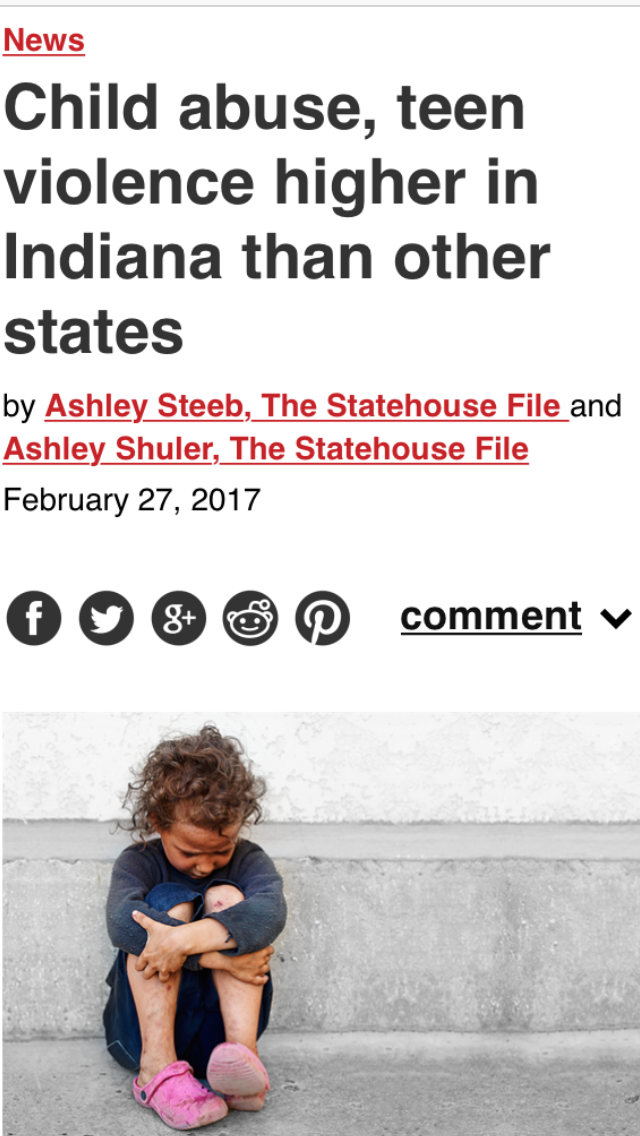|
By: Alaina Sermersheim The Health & Fitness Fair was held Tuesday, August 27th during Harrison Hill Elementary School's 2019 Back to School Night. Over 30 community organizations gathered in the cafeteria to connect with students, parents, staff, and teachers. I connected with staff and families about services at Beacon of Hope Crisis Center, volunteering and talked with families about our Foster Pet Program. Many individuals mentioned how unique the Foster Pet Program is and talk of the program spread quickly. Throughout the night, other families found us to request more information. We are always looking for loving families to join our program, to learn more click here.
Candy and coloring pages were a nice surprise for the kids stopping by our table. This kept them entertained as I spoke with their parents and teachers about healthy relationships, family violence and free services for victims. I also answered questions and provided resources to those looking to educate themselves further. This event was a great opportunity to gain visibility while connecting with families that may need our services. Thank you again to Harrison Hill Elementary School for inviting us to participate in this fantastic event! By: Savannah Tipton We live in an age of technology where nearly every person over the age of 15 has a phone. Not only do we have phones, but we are on them constantly. We enjoy playing games, exploring social media, messaging friends and family, and so on. Many people relate to the daily behavior of checking their phone before going to bed at night and again when they wake up in the morning. Younger children also have access to utilize phones, iPads, tablets, etc. While technology can be a tool for learning and connections, it can also be abused. This constant connection to the outside world can create huge risks to someone’s safety and personal well-being.
Perpetrators of domestic violence and sexual assault often use technology to monitor someone’s online activity, harass, intimidate, threaten, or otherwise control a victim. Victim advocates are available to complete technology safety plans for survivors suffering from digital abuse or harassment. Digital abuse can be used to manipulate both domestic violence and sexual assault survivors. Types of abuse perpetrated through technology:
If you or someone you know is experiencing digital abuse, please contact our confidential crisis line. Advocates are a confidential source of support available to help survivors navigate these kind of situations and can connect you to community resources. Confidential Crisis Line: 317-731-6140 By: Savannah Tipton Society has typically associated feelings of grief to the death of a loved on. We can understand that someone may have difficulty processing the death despite the circumstance (illness, accidents, etc.). When we expand the definition of grief to include other things that are lost, society gives less acknowledgement or validation. Survivors of domestic violence may experience grief over lost self-esteem, loss of their home and the life they knew, or even the future they once planned for. They may experience this grief during and after the relationship has ended. There are many reasons survivors do not disclose abuse (humiliation, fear, guilt, shame) and this can further complicate feelings of grief. Survivors need access to support as they start their healing journey. Some may find support from friends and family while others turn to professionals.
To better understand the connection between grief and domestic violence, we must first look to all that a survivor of domestic violence may lose or leave behind after being victimized (see below). Together we can become more educated and give survivors validation to grieve or mourn all that they have lost. Advocates are available to validate feelings of grief and connect clients to supportive services and free counseling. Confidential Crisis Line: (317) 731-6140 Losses Which Are Grieved
By Sandra K. Ziebold and Merideth Bush Beacon of Hope is a Christ-centered crisis center. To some, it may sound as though we exclusively offer services to the Christian community or that we impose Christian beliefs on those we serve, but this could not be further from the truth. When we say that we are a Christ-centered agency, we mean that our approach to victim services seeks to imitate the qualities exemplified by Christ’s interactions with the hurting people in his community: qualities such as kindness, respectfulness, non-judgement, and acceptance.
What does this look like in practice? It looks like reaching out to leaders of refugee communities, including those which represent ethnic and religious minorities, so that they know what the laws are regarding intimate partner violence, how to recognize it, and where to find service providers that will respect and accommodate their religious and cultural needs alongside traditional legal and advocacy services. It looks like looking past gender stereotypes to recognize that 1 in 4 men will experience intimate partner violence in their lifetime. We welcome and advocate for male victims with the same dedication and compassion we show to female victims. It looks like reaching out to service providers of our immigrant population to make sure they know that they can seek help to escape intimate partner violence regardless of their citizenship or immigration status. It looks like seeking partnerships with interpreters so that we can overcome language barriers. Domestic violence and sexual assault are not limited by languages. The advocacy we offer shouldn’t be either. It looks like recognizing that the LGBTQ+ community suffers from domestic violence and sexual assault with the same frequency and severity as their heterosexual counterparts, and welcoming members of this community with open arms when they choose to seek help. It looks like the relief on the face of a client from a marginalized community when they turn to us at the end of an advocacy appointment, smile for the first time that day and say, “Thank you. I honestly didn’t think I’d find anyone willing to help me.” This is Beacon of Hope’s Christ-centered approach to victim advocacy in action. Regardless of race, religion, gender, culture, sexual orientation, or any other label that may differentiate us, the Christ-like qualities of kindness, respectfulness, non-judgment, and acceptance are the inspiration for our interaction with every client, and lie at the very heart of who we are at Beacon of Hope. By Lauren Shafer It can be challenging for a victim to keep a strong bond with their child while they seek help after an abusive relationship. Some ways to ensure a healthy relationship between the parent and their child is to try the following:
Sources: http://www.singleparents.org.uk/information/abuse-violence/top-10-tips-for-parenting-during-and-after-domestic-abuse http://www.instituteforsafefamilies.org https://www.pinterest.com/pin/498773727457228021/ http://sophia.stkate.edu/cgi/viewcontent.cgi?article=1367&context=msw_papers |
About this blog
This blog is about our domestic and sexual violence crisis center, Beacon of Hope. We hope you find it full of helpful information, motivation, creativity, serious facts and positivity. We hope that it will help you know what is happening in our center, in our community and with our events. We hope you follow our blog in support of our organization and our mission. Archives
October 2024
Categories
All
|
|
CAREER opportunities © 2024 Beacon of Hope Crisis Center Privacy Policy Accessibility Statement Training Portal Login |








 RSS Feed
RSS Feed